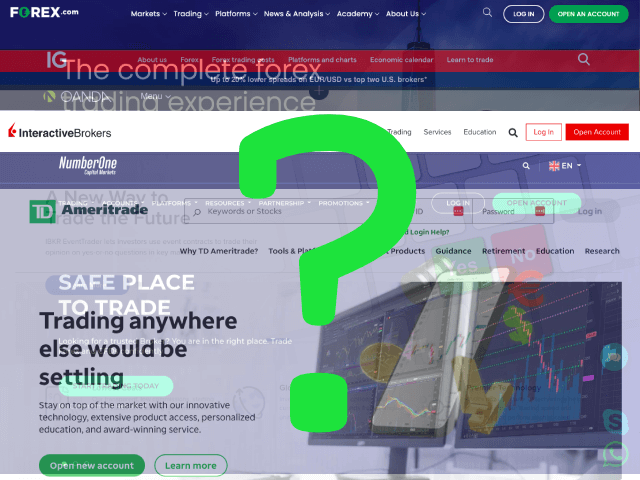
If you know what you’re doing, this is a great time to be in the foreign exchange market. The recent global economic uncertainty has meant unprecedented volatility in the forex markets. For a good forex trader, volatility equals opportunity.
The increased volatility in forex markets also means higher risk, however, so don’t increase your risk by choosing the wrong forex broker
Due to US regulations, Americans who wish to trade forex have fewer options than international forex traders, but there are still some great forex brokers accepting US clients. I’ve tested a great deal of them and compiled a list of my favorites.
Table of Contents
Review summary
This chart summarizes and compares account details of the best forex brokers for US clients. Please read on for my detailed reviews.
| Best Overall US Forex Broker | Best Forex Trading App for US Clients | Safest Forex Broker for US Clients | Best Unregulated Forex Broker for US Clients | |
| Firm | Forex.com | OANDA | IG | N1CM |
| Pros | Complex trading tools on a simple platform Access to algorithms and excellent analytics Flexible fees with discounts for high-volume traders Great educational resources Fully regulated in US & beyond 80+ currency pairs, futures, options, gold & silver | Mobile trading app is best in the biz Simple, highly customizable platforms Quick account setup and withdrawals Great for beginners Best customer service Fully regulated in US & beyond | Lowest spreads among regulated US forex brokers Outstanding trader resources, charting and analytics “Client sentiment” data great for trade ideas Fully regulated in US & beyond 80+ currency pairs | Up to 1000:1 leverage Offers a 35% signup bonus Trade CFDs, even though they’re not permitted with regulated US brokers Most trustworthy of offshore brokers Trade crypto, shares, commodities in addition to forex |
| Cons | Customer service department struggles with complex cases | “Only” 68 currency pairs on app Web platform doesn’t live up to amazing app | Trading platforms not as visibly appealing Educational resources not integrated into app | All withdrawals and deposits must be in crypto No proprietary platform, only MT4 and MT5 “Unregulated” |
| Get Started | Forex.com | OANDA | IG | N1CM |
My top pick: Forex.com — 9.4/10 (Best forex broker for US clients)
Forex.com offers the most complex trading tools on the simplest trading platforms in addition to its outstanding analytical and educational resources. A customer service department that can get bogged down if account issues arise is the only thing keeping Forex.com from a perfect score.
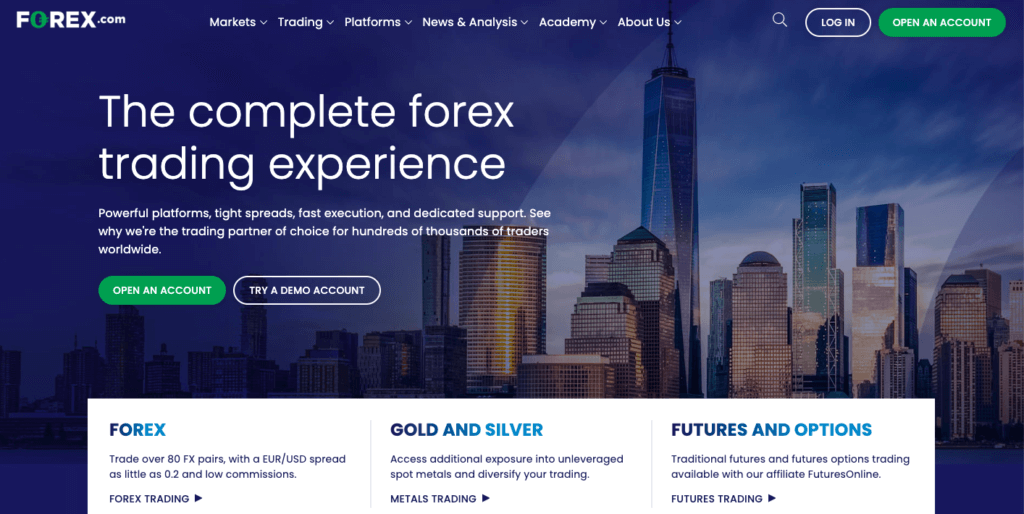
Pros
Forex.com manages to do something that most brokers cannot—they keep things simple but still offer all the complex trading tools you might need. Their trading platform and their mobile app are both packed with charting tools, drawing tools, and a ton of market analysis. But despite all that and more, Forex.com keeps its platforms accessible to even the most inexperienced traders. Thanks to the wide range of options, every forex trader will feel like Forex.com designed their platforms specifically for them.
Forex.com also differentiates itself from other forex brokers through proprietary algorithms and analytics. Their SMART signals algorithm uses historical prices to find trading opportunities and even breaks down the success rates of traders who traded off the identified signals. If you prefer humans to algorithms, Forex.com analysts are constantly updating forecasts and opinions. In addition to their in-house experts, traders also have access to Trading Central and all of its insights and analytics.
Indeed, it seems like Forex.com has spared no expense in keeping its traders educated and up to date. If you are a trader who is a little lacking in inspiration and needs help finding trading ideas and opportunities, Forex.com would be a great broker for you.
They’re also innovators when it comes to their fee structure and some of their trading incentives. When you sign up with Forex.com, you can choose a cost structure that is best suited for your trading style. High-frequency traders, for example, can opt for a program that issues rebates for every trade made. The program saves about 15% for its active traders, which can really add up in the long run.
Forex.com innovates like they’re the new kid on the block, but they’ve actually been around for more than 20 years and are heavily regulated. In addition to our friends at the CFTC and the NFA, Forex.com is owned by StoneX Group, which is traded on the NASDAQ, so you can add the SEC as another watchful eye making sure your money is safe.
If you like to trade more than just forex, Forex.com, despite the name, also offers futures and options, plus gold and silver, in addition to more than 80 currency pairs.
Finally, even if you don’t choose Forex.com to be your broker, you should take advantage of their great educational resources. For beginners, the two-hour live introduction course they offer is not to be missed.
Cons
The main knock against Forex.com is its customer service department. Like any other highly regulated forex broker, Forex.com must abide by KYC (Know Your Client) protocols, which require them to verify the identity of traders both at the time of sign-up and sometimes also after withdrawal requests.
Usually it’s not a big deal and the whole process is nearly instantaneous. However, if there is any sort of hiccup, it can mean substantial delays in opening an account or withdrawing your money. This is when the customer service department comes in. If, for whatever reason, your account opening or a withdrawal gets flagged, Forex.com can struggle to get everything back on track.
I personally did not have any issues opening an account or making withdrawals, and most traders won’t, but if you do it’s . . . extremely frustrating. My general rule is this: if the account-opening process goes smoothly for you, withdrawals will probably be just as simple, so enjoy the impressive services offered by Forex.com
Overall
If you’re able to avoid customer service issues, Forex.com is an incredibly secure broker with an outstanding trading platform and a great mobile app. For traders of any experience level, Forex.com is a great choice to help you make the type of informed, intelligent trades that can make you a profitable forex trader.
My runner-up: IG — 9.3/10 (Lowest spread forex broker for US clients)
IG is a world-renowned broker with the lowest spreads I’ve found among US forex brokers. For high-frequency traders, IG is a great option to keep your trading costs low without sacrificing security or trader resources.
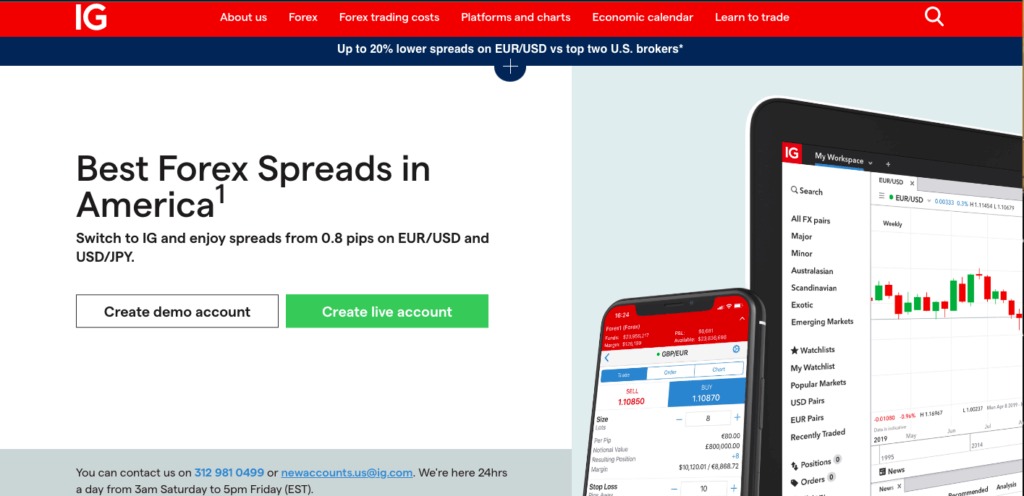
Pros
IG is known as one of the safest brokers in the world. If there’s a broker that is regulated in more juridictions, I haven’t found it, plus they’re publicly traded, which may make them one of the most scrutinized companies in the world. Rest assured, your money will be safe with IG.
Heavy regulation can mean hefty compliance expenses, but IG manages to keep their overall trading costs very low. Spreads are constantly changing, of course, so it can be difficult to compare exact prices, but personally, I’ve found IG to be the cheapest of the regulated brokers I’ve tried. Maybe not by a lot, but in forex trading, every pip counts.
IG offers over 80 currency pairs to US traders, so even if you like trading exotic pairs, IG has you covered. Obviously the spreads aren’t as tight on the exotics as on the major currency pairs, but IG is still a hair cheaper in my experience.
I also love IG’s overall offerings in terms of analytics and trader resources. Although they don’t offer quite as many charting offerings on their trading platform as Forex.com, IG has more than enough for even the most dedicated technical analyst.
They also offer “client sentiment” data, which is very useful. At any given time, you can see exactly what percentage of other IG traders are long or short on any currency pair. What you do with this information is up to you, of course, but with a broker as big as IG, that’s a pretty interesting metric.
IG also uses the client sentiment data to help you with trade ideas. If you are looking to trade one particular currency pair, IG shows what other pairs traders who have that position are trading, so you can see what’s on other traders’ radars.
I’m also impressed by IG’s forex education program, which is second to none as far as brokers go. This might not mean much to you if you’re an experienced trader, but even pros can benefit from the one or two free webinars that IG offers per day.
Finally, IG’s customer service department is one of the best of the regulated brokers.
Cons
The main reason IG slid to second in my rankings is a highly subjective one, I’m afraid. Both their web platform and their mobile trading app aren’t so easy on the eyes. That might seem like a very silly complaint, but I’m spending hours staring at these screens. If I’m missing out on trading opportunities because I can’t stare at their platforms any longer, that costs me money.
Like I said, that’s very subjective, so if you’re on the fence about IG, please try them out in demo mode and see if you agree. If not, then by all means, go with IG. But for me personally, Forex.com offers more capabilities and is a much more simple, pleasing platform.
More along those lines—although IG’s charting options are great, the charts aren’t so easy to manipulate. They’re not as “user friendly” as what OANDA or Forex.com offers.
As much as I like the educational resources offered by IG, it bothers me that they are not fully integrated with the mobile app. If I want a quick refresher on something, I have to exit the IG app and look it up on the Trader Academy app. Not a big deal if you don’t plan on doing any mobile trading, but for new traders, it’s a nuisance.
Overall
I love IG’s security, low trading costs, array of exotic pairs, and customer service department. I’m not so crazy about the overall layout of their trading platform, but if that doesn’t bother you, IG is an excellent option.
#3: OANDA — 9.1/10 (Best forex trading app, best for beginners)
The most impressive thing about OANDA is their mobile trading app. OANDA offers its traders all the necessary tools in a clean, simple interface that makes forex trading seem easy. If you’re going to trade on the go, go with OANDA.
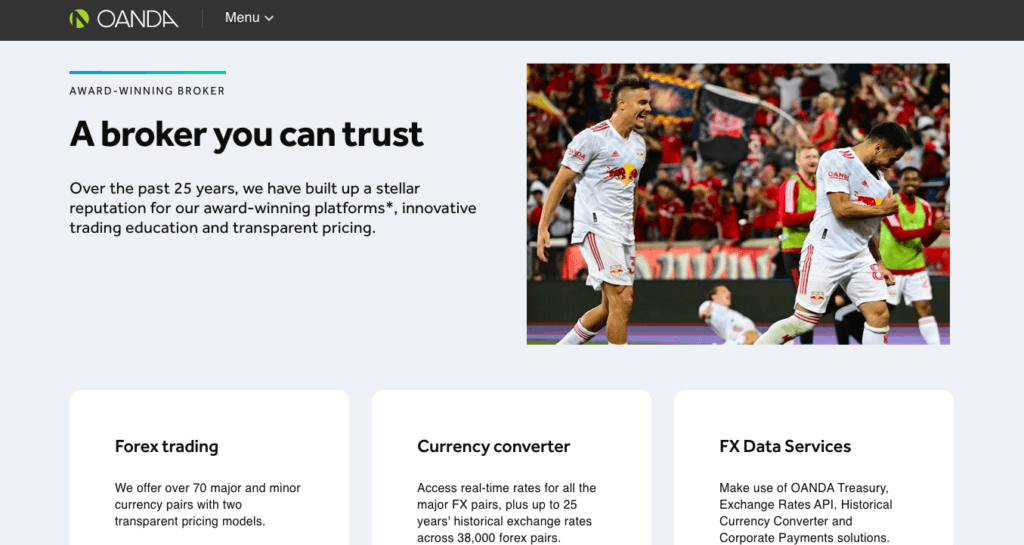
Pros
We’ll start with their mobile trading app, known as fxTrade, because that’s what attracted me to OANDA in the first place. It’s pretty clear that they made an enormous investment in designing and programming the best forex app in the world, because that’s what they ended up with. Every screen is simple but loaded with information and options.
I particularly like the charting options. You can access them from the homescreen, which always displays the chart of your favorite currency pair. One tap on the chart and you’re inundated with overlays and indicators plus a number of drawing options. There are more trading tools packed into this app than you’d find in an entire trading room 20 years ago.
You could probably say that about any of the trading apps these days, but what sets OANDA apart is its incredible options for customization. You can take this app and shape it into exactly the trading tool you need. Just by way of example—some charting options come with 19 color choices. Maybe that seems like overkill, but I’m always reminding new traders of how important it is to be comfortable with your trading platform. OANDA gives you the ability to shape that platform however you like.
The simple functionality of their trading platforms is the main reason I think OANDA is the best forex broker for beginners, and that’s really apparent on the trade screen. Getting in and out of position is incredibly easy, with a clearly disclosed spread, so you know exactly how much the trade is costing you.
OANDA didn’t invest all their money in platform programming and development. They’ve also made significant investment in their customer service department, and it shows. Where most of the other forex brokers have difficulty, OANDA excels. From your initial contact as you open an account to any issues that may arise along the way, OANDA’s customer service department is responsive and knowledgeable.
Despite their reputation as sort of a new kid on the block, which comes largely from their willingness to innovate, OANDA has been around for more than 25 years and is regulated in the US by the NFA and CFTC, and in the UK, Japan and several other countries. They are extremely trustworthy and secure.
Cons
For a broker that started out with forex and doesn’t do a whole lot more in the US, I am a little disappointed in the number of available currency pairs. I counted 68 pairs that you can trade, which should be more than enough for most traders, but if you love trading exotic pairs, other brokers offer 80 or more pairs.
As far as trading costs, OANDA is quite competitive with the brokers above, but occasionally I’ve caught them being a couple pips more expensive. I love their transparency, however, and unlike other brokers, you always know exactly what you’re paying with OANDA.
As much as I love fxTrade, the OANDA trading app, I’m not as excited about their web app. Yes, it has all the functionality and then some, but it lacks the visual appeal and isn’t quite as user friendly. It’s still great, but just doesn’t live up to the app.
Overall
If you plan on doing most of your forex trading while on the go, then OANDA is your best choice. The OANDA trading app is outstanding. If you’ll be at your desk, however, you’re probably slightly better off with forex.com.
#4 Interactive Brokers — 8.6/10
Interactive Brokers is one of the best known brokers in the world. Forex might not be their chief focus, but they offer great spreads and comprehensive, albeit complex, trading and charting options.
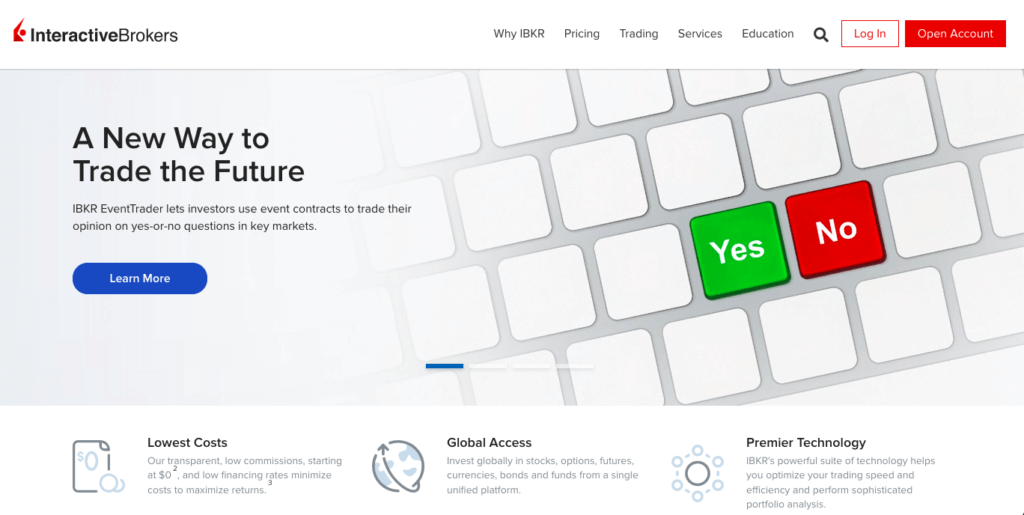
Pros
Interactive Brokers is cheap. I’m not talking about how they stock the break rooms in their corporate headquarters, I’m talking about spreads. Most traders I know who use Interactive Brokers do so for one reason: pricing. No matter what financial instrument you’re trading, Interactive Brokers will give extremely competitive pricing.
You’ll also feel like a real pro when trading with the Interactive Brokers trading platform. They offer more trading options than just about anyone, including market-if-touched orders, limit-if-touched orders, and more.
There’s also a dizzying array of charting options, even on their mobile app, with more than 60 indicators broken down into six categories. If those terms don’t mean anything to you, you might want to use a broker that’s more geared towards beginners, but for experienced traders, Interactive Brokers offers a full toolbox.
Another good reason to use Interactive Brokers is that they are one of the most trusted brokerages in the world. According to their own statistics, they have nearly two million traders in more than 200 countries. They’re also one of the most heavily regulated brokers in the world, are publicly traded on the NASDAQ, and proudly point to their coffers where they keep more than $7 billion in excess capital. Safe to say, they’re safe.
Interactive Brokers also uses at least a little bit of their capital to fund a pretty comprehensive trader education program called IBKR Trading Academy. It’s a wide-ranging program that covers everything from how to use their proprietary trading platforms to the very basics, like an introduction to economics. Even if you don’t ultimately choose Interactive Brokers, you should take advantage of their educational resources.
Cons
Like a lot of the larger forex brokers, it can be easy to get lost in the shuffle with Interactive Brokers. Initial dealings with customer service are pleasant and productive, but should you require more detailed help, like if your withdrawal runs into KYC protocol issues, you can be in for a lengthy runaround. This seems to be the case with most of the brokers this size, but Interactive Brokers has more than their share of customer service complaints.
Interactive Brokers also offers access to a number of financial markets. That’s great if you’re a trader who wants to have their hands in everything, but it can seem like too much of a good thing if you are laser focused on forex.
In fact, forex seems pretty low on Interactive Brokers’ priority list. This is anecdotal evidence to be sure, but if you go through their list of educational resources in the Trading Academy, they list forex trading below 39 (by my count) other subjects—just after their courses on municipal bonds.
A lot of Interactive Brokers software is designed more for professional traders, and I mean professional professionals. If you haven’t been at this for a while or weren’t trained on a trading floor, their trading platforms, like Trader Workstation, can get overwhelming. They offer several platform alternatives, however, so you should be able to find a platform suitable for your trading abilities.
Their mobile app, IBKR Mobile, is also quite a bit cleaner than the desktop version, but I still personally found it difficult to navigate and more than once was logged out due to a server issue or “inactivity” even though I was actively using the app.
Overall
If you’re an experienced trader who values security and low trading costs over a wide range of financial instruments , Interactive Brokers is an excellent choice. If you’re not quite as experienced or just want to trade forex, you may want to opt for one of the brokers I listed above.
#5 N1CM 8.5/10 (Best unregulated forex broker for US clients)
There are some definite advantages to using unregulated brokers, but obviously there’s greater risk involved as well. If you’ve decided to go the unregulated route, I believe N1CM is the most trustworthy unregulated forex broker accepting US clients.
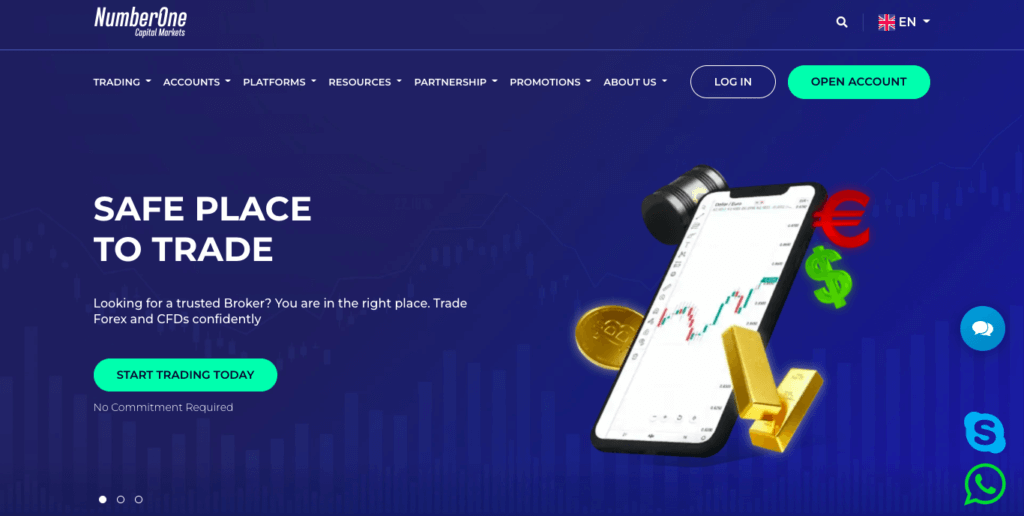
Pros
Like a lot of “offshore” or “unregulated brokers” N1CM is actually regulated, just not in a jurisdiction that myself or any of my readers are from, unless you happen to be reading this from Vanuatu. The Vanuatu Financial Services Commission doesn’t offer a whole lot of protection for US retail clients, but there is someone with some oversight over N1CM’s brokerage activities.
What you lose in security with an unregulated broker, you gain in leverage and leveraged assets that you can’t trade with a US forex broker. CFD trading isn’t permitted in the US, for example, but N1CM offers CFDs in addition to other more exotic trading instruments. As far as leverage, N1CM offers up to 1000:1, which is about as high as you’ll find anywhere.
Other benefits of offshore brokers that N1CM offers are frequent sign-up bonuses. Currently N1CM offers a 35% first deposit bonus. That’s a pretty significant boost to your trading capital.
N1CM also features very competitive spreads, in part because as an offshore broker their administrative costs are significantly lower than a regulated broker that has to deal with the significant costs of proving compliance to any number of regulatory agencies.
I also like N1CM for their integrity. There are literally thousands of offshore brokers out there, and if you somehow find it cathartic to read angry reviews on the internet, you can start with just about any of N1CM’s competition. But even among traders who had issues with N1CM, I couldn’t find anyone complaining of lost deposits or shady practices. That’s pretty rare in the offshore brokerage world.
Cons
The question is, do you really need that much leverage? Do you need to trade CFDs? CFDs are very popular in Europe, but typically more than two thirds of all retail CFD accounts lose money. And leverage can work against you as easily as it can work for you.
In addition to the cons traditionally associated with offshore brokers, many offshore brokers now have another significant drawback—most of them don’t have proprietary trading platforms and use only MT4 and MT5. That wasn’t a problem at all until recently, when Apple took both platforms out of the App Store. If you use a Mac or an iPhone, you won’t be able to download the necessary platform in order to trade with N1CM.
N1CM is also a smaller broker, which can mean good things when it comes to personalized customer service, but it also means they’re a little slower than the larger brokers. That means slower execution speeds and a little more slippage. I didn’t experience anything outrageous when I traded with them, but losing a tick or two can make a big difference over the course of a lot of trades.
Finally, in order to trade with N1CM, American clients must make deposits and withdrawals in cryptocurrencies.
Overall
In general, I always urge traders to stick with regulated brokers, but if you’ve decided to go the offshore route to maximize your leverage or for some other reason, N1CM is as reputable and honest as they come.
#6 Thinkorswim 8.0/10
Thinkorswim is the trading platform for TD Ameritrade, which officially became a part of Charles Schwab in 2020. Although forex trading through thinkorswim is okay, the massive corporate entity that came out of the merger still has a lot to do before it reaches its potential and becomes a viable option for forex traders.
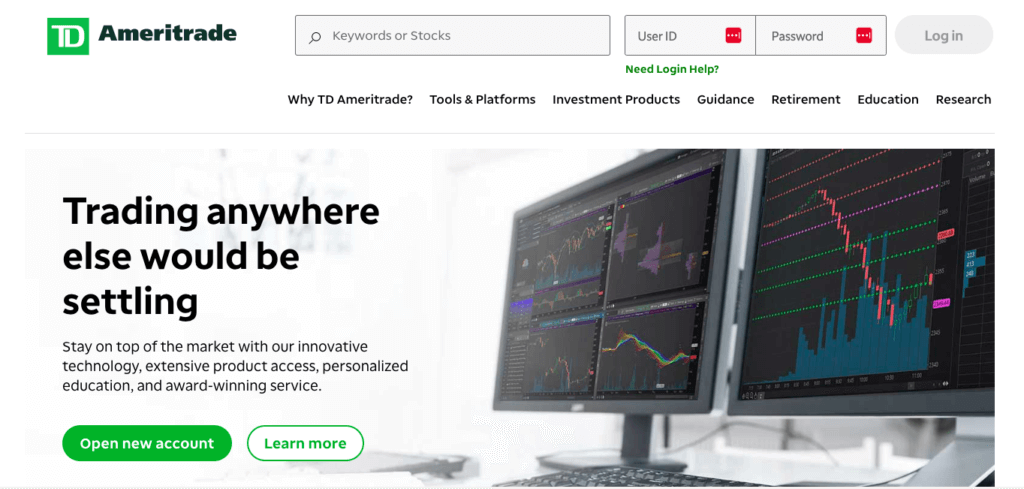
Pros
I love Charles Schwab and I love thinkorswim, and I’m optimistic that further integration of the two companies will eventually result in a great forex broker option. The question is when. Schwab is predicting that clients will see the complete benefits of the merger by mid-2023.
Three years seems like a long time to realize synergies from a merger until you consider the sheer size of the organizations involved. At the time of the merger, TD Ameritrade had 12 million clients, all of whom are migrating to Schwab accounts. That’s a massive undertaking, but when the dust has finally cleared, traders should reap the benefits.
For example, I have a Schwab checking account. I love it for a number of reasons, but mostly because I do a lot of international traveling and Schwab covers all my foreign ATM fees and offers a great exchange rate. I don’t, however, love Schwab’s brokerage account, in part because I can’t trade forex.
Thinkorswim, however, offers access to 70 currency pairs with a solid mobile trading app and decent spreads. When the companies fully integrate, theoretically I could have all the advantages of a great bank and a solid forex broker with just one account. That would make my life just a little bit easier.
While the thinkorswim platform is clearly geared toward traders of other assets, the forex trading tools are fairly impressive. I hope they continue to develop the charting options, but there’s enough to satisfy the average trader, and placing orders with stop losses or other directives is extremely easy. For beginners, thinkorswim has a number of integrated educational tools as well.
Cons
You may notice that a lot of the pros I listed above are theoretical. Yes, there’s a lot of potential for a great brokerage/bank that would be a one-stop shop for all your financial needs. Unfortunately, that’s not the current reality. So far, the merger has caused a lot of customers a lot of headaches.
You need not look far (Trustpilot) to find a slew of complaints from current clients. Most of the complaints are directed toward the customer service department rather than the actual trading platform, but it seems that TDSchwaborswim (or whatever you want to call this current half-integrated entity) has failed some traders in some pretty miserable ways.
It makes sense for there to be some growing pains, especially as TD Ameritrade accounts convert to Schwab accounts. That’s 12 million accounts that need to be integrated into a new system. Still, the number of traders who have encountered withdrawal issues is pretty inexcusable.
I should say that I, personally, have not experienced any disruptions. Schwab remains my favorite bank. I’m still hopeful that we end up with the best of Schwab and the best of TD Ameritrade at some point, but that still seems like a long way off.
Overall
The potential for Schwab/TD Ameritrade and their integration of the thinkorswim trading platform is massive, but I’m taking a wait-and-see approach for the time being. It may not be until 2024 that a fully integrated broker emerges from the current mess.
How to choose a forex broker (my methodology)
If you are one of my regular readers, hopefully you’ve already read my detailed guide to choosing a forex broker, but here’s a list of the most important factors to consider.
For the purposes of these forex broker rankings, I graded each broker on a scale of one to ten in each of these eight factors. I then tallied up the scores and averaged them out to arrive at the final scores that are reflected above.
I should mention that with some online brokers, I only opened a demo account rather than depositing money with every single forex brokerage I could find. I would urge you too to open a demo account with any broker you’ve got your eye on. Demo accounts are invaluable for learning the mechanics of the forex market, testing trading strategies, and getting used to trading conditions.
Factor 1: Trading platforms
Most forex brokers offer several options when it comes to trading platforms. Traders can typically choose between MT4 or another generic trading platform and the broker’s own proprietary trading platform. Since MT4 is ubiquitous, I judged the above brokers based on my experience on their own trading platforms.
When judging the platforms, I looked at both the desktop and mobile versions, when offered. Some professional traders scoff at those of us who occasionally trade on our phones, but to me that’s one of the great advantages of currency trading these days—I can trade from anywhere in the world.
When judging trading platforms, I looked at five main factors: Ease of use, functionality, appearance, speed, and customer service response time.
Factor 2: Trading costs
Forex brokers make most of their money through commissions and spreads. Commissions are very straightforward but increasingly rare for forex brokers. A commission is simply a fee charged for every transaction you make. Forex brokers are moving away from commissions, probably because they can hide the true costs a little easier in the spreads.
Spreads are simply the difference between the price you can buy and the price you can sell. Forex brokers will sell a currency at one price and buy at another, keeping the difference. It’s a little more opaque than just a straight commission, and some novice retail traders might not even notice. Wide spreads, however, can really eat into your profit margin.
I ranked each forex broker according to their average spreads, although I should note that at the time of this writing spreads were quite high due to extreme market volatility.
Factor 3: Trade execution
These days, most brokers execute trades within nanoseconds of you sending the order, but there are still some brokers that are a little faster than others. The difference might be negligible in terms of nano seconds, but when markets are moving quickly, you need to get your orders fulfilled as quickly as possible. Any slippage (the costs that are incurred between when you place your order and when it’s executed) can really affect your profits.
Factor 4: Regulation and reputation
This is a huge factor for traders who live in other jurisdictions, but for US forex traders this isn’t as much of a concern, so long as you choose a regulated broker. Thanks to the Commodity Futures Trading Commission (CFTC), the National Futures Association (NFA), and the Financial Industry Regulatory Authority (FINRA), for brokers dealing with securities, US brokers are very closely monitored. That doesn’t mean they’re perfect, and that doesn’t mean your deposits are federally protected like they would be in a bank. What it does mean, however, is they are not absconding with your deposit.
It’s a little trickier with offshore forex brokers. If you decide to go that route, and there are some reasons you should, although I suggest you don’t, you have to look at reputation since regulation is relatively light. Trader message boards, professional reviews, Telegram channels and groups are all good resources to look into offshore brokers.
Factor 5: Tradable assets
For those of you who only trade the major currency pairs or major crosses, this might not be such a big issue to you. All forex brokers trade the major pairs and crosses. If you are the type of trader who loves to dig for opportunities in exotic currency pairs, however, make sure your broker offers a wide variety.
You may also be interested in trading other assets, and some US regulated forex brokers also offer more than just forex. For the sake of this article, however, I only judged the brokers on their forex offerings.
Factor 6: Trading resources and education
Trading forex often means a lot of technical analysis, which means you need the right resources for charting purposes. Forex brokers vary widely in what charting tools they offer, so if you’re a die-hard believer in certain indicators, or require certain drawing tools, make sure your broker of choice offers them. I have my own favorites too, of course, but for the purposes of these rankings, I rated each broker based on how many options they have both on their mobile apps and on their desktop trading platforms.
Trading resources also include economic calendars, and although you’d think there wouldn’t be too much variance in simple calendars, some forex brokers have really gone above and beyond with data indicating consensus predictions, expected volatility should the news break one way or the other, and even what positions other traders are taking.
Factor 7: Withdrawal process
I hate the fact that the withdrawal process is a factor. Withdrawals should be incredibly simple. It’s your money, after all! The sad reality is, however, that making a withdrawal from your own forex trading account can be a chore, and some brokers handle the process much better than others.
If you’re trading with a shady, unregulated, offshore broker, they might be holding up your withdrawal for dubious reasons, but reputable brokers also have withdrawal issues thanks in large part to anti-money laundering laws. These laws stipulate that forex brokers abide by KYC (Know Your Client) protocols, which means there are identity verification procedures involved in any deposit or withdrawal.
Usually identity verification is very straightforward and the vast majority of traders will have no issues. However, if, for whatever reason, there’s some sort of irregularity detected in your paperwork, it can take forever to straighten things out and get you your money.
The best forex brokers resolve withdrawal issues quickly, but some simply don’t have the resources to handle complicated cases in a timely fashion.
Factor 8: Customer service
It’s easy to overlook a forex broker’s customer service department. You only need them when things go wrong and if you have a good broker, things should never go wrong. Problem is, things do go wrong. Sometimes disastrously so, and since we’re talking about forex brokers, there’s always money on the line.
Customer service is also the face of the KYC protocols. They are in charge of implementing them. They are the ones who can help you out if you get stuck in some sort of identity verification morass. For this article, I contacted the customer service departments through chats, emails, and phone calls.
Risks of forex trading
I want to emphasize again the risks involved in forex trading. Do not trade with money that you absolutely cannot afford to lose. As I said in the intro, the unprecedented volatility in the markets today means there are opportunities for enormous gains, but the opposite is true as well. Even experienced forex traders have lost considerable sums in these choppy markets. Be careful!
How to start trading forex
I covered this more extensively in another post, but here, very quickly, are three steps to get you started currency trading:
Step #1: Learn the forex market
Surprisingly, a lot of traders skip this step. If you’re going to put money on the line, take the time to learn the market you plan to trade. This is especially true if you are getting investment advice from someone else. If someone tells you they’ve got a surefire way to make money in the forex market, they are probably lying to you. Understand the risks yourself. There are so many free resources at your disposal these days, so there’s no excuse not to really dig in and understand the forex market before you get started.
Step #2: Choose the best forex broker for you
Since you found this article, I hope you’ve already accomplished Step #1. You can read my methodology above, which gives you a blueprint for how to choose the best broker, and you won’t go wrong if you follow my recommendations. I will just add this here: at the end of the day, you’re the one putting money on the line, so make sure your broker is the best fit for you as an individual. To that end, please, trade with a demo account before you make a commitment. A demo account should tell you everything you need to know.
Step #3: Open your forex account
Opening a forex account is pretty simple, provided that you have the right documents. This usually just means a government issued ID and a utility bill or similar document with your current address. Once your broker verifies your documents, which is usually a quick and painless process, you just have to fund your account and you’re in.
Best US forex brokers conclusion
Dramatic swings in the forex market recently have led to unprecedented profit opportunities. Of course, that also means substantial risk, but with a solid trading strategy, sound risk management techniques, and the right broker, you can become a very successful forex trader.
The strategy part is up to you, but I can help with some ideas about managing your risk, and I can lead you in the direction of the right broker—get started with Forex.com today, and you could be well on your way to a profitable career as a forex trader.
